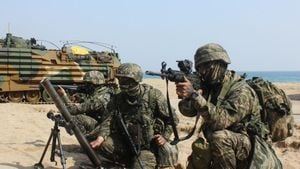The conflict between Russia and Ukraine remains intense, particularly within the Donbas region, with significant military movements reported from both sides. Recent offensives have seen Russia aiming to consolidate its hold on territory gained during the invasion, but Ukrainian forces are fighting back fiercely, causing substantial Russian losses.
According to the latest estimates, Russian casualties have reached alarming levels, with reports indicating thousands of troops killed or injured during the recent push. The Ukrainian defense forces have claimed successful counterattacks, particularly around key locations like Bakhmut and Avdiivka, where Russia has deployed large numbers of personnel.
International observers note the persistent struggle of poorly supplied Russian forces, struggling with logistics and command structures. A recent analysis from the Institute for the Study of War suggests Russia's operational capacity has been significantly undermined.
While Russia seeks to reinforce its positions, the Ukrainian government has ramped up efforts to gather international support. Ukrainian President Volodymyr Zelenskyy emphasized the importance of Western military aid during meetings with leaders of NATO countries, citing the need for advanced weaponry to turn the tide of the conflict. "We must secure our sovereignty and our people’s safety. This requires not just words but decisive actions,” he stated emphatically during one such address.
Officials report increased military assistance from Western allies, including America’s commitment of additional artillery and ammunition. The U.S. is also reportedly evaluating options to send modern fighter planes to bolster Ukraine’s air defenses.
The humanitarian situation remains dire, especially for civilians caught amid the fighting. UN reports indicate over 10.6 million people have been displaced since the onset of the war, with many unable to return home due to continued violence and instability. Ongoing Russian bombardments have led to civilian casualties, leaving towns and cities decimated.
The UN High Commissioner for Refugees noted, "The plight of those displaced cannot be overlooked. We need continuous support for humanitarian aid and rehabilitation efforts. Our goal is to alleviate their suffering and provide them with safe alternatives.”
Despite the devastation, diplomatic conversations continue at multiple levels. Recently, France’s President Emmanuel Macron mentioned the potential for peace talks, stating, “While discussions might seem far-fetched amid such violence, we are pursuing diplomatic pathways.” Macron’s remarks came at the backdrop of his meeting with President Biden, where they affirmed commitment to peace, though without any concrete timeline.
From the Russian side, official statements highlight their strategy to regain territorial losses experienced during prior military operations. Russian President Vladimir Putin emphasized the need for “strategic patience” during recent briefing sessions with military officials aimed at reassessing their approaches following repeated setbacks.
Meanwhile, the diplomatic rear guard involves various stakeholders, including Turkey, which has offered to mediate talks. Turkish President Recep Tayyip Erdoğan reiterated this offer amid concerns of falling civilian hardships and geopolitical instability affecting not just Ukraine but broader regional dynamics.
Despite calls for peace, the battlefield sees no signs of tranquility, as military engagements intensify. There is also concern of possible escalation should Western nations decide to directly intervene more militarily on Ukraine's behalf, thereby provoking potential Russian retaliations beyond Ukraine’s borders.
Analysts stress the need for all parties to carefully weigh their responses. “We are at a pivotal moment where miscalculation could lead to wider conflict,” observed political scientist Dr. Natalia Shulha. “The stakes remain incredibly high not just for Ukraine but for global equilibrium.”
Up on the international front, the UN continues to voice concerns over the humanitarian impact of the conflict. Recent votes have cleared resolutions condemning aggression and demanding humanitarian access, yet implementations remain strained by ground realities. Humanitarian organizations find it increasingly difficult to operate within active conflict zones.
European leaders are also pushing for Ukraine’s path toward EU accession, with longstanding commitments being reinforced amid the war; some speculate membership may be achievable before 2030 if reforms maintain pace as highlighted by EU Commission President Ursula von der Leyen.
Yet with each passing day, the ground both militarily and politically is shifting rapidly, and the full extent of the outcomes remains uncertain. With rising casualties, potential diplomatic recess strategies under consideration, and complicated alliances being tested, the coming weeks will be pivotal for both Ukrainian sovereignty and international geopolitical stability.



